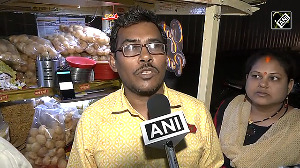Prime Minister Manmohan Singh has said that India and China should pursue an early settlement of the boundary issue as a strategic objective while not allowing such differences to affect the positive development of the bilateral ties.
"I am going (to China) with an open mind to hold free and frank discussions on all issues of common interests with a view to shaping a relationship that befits our two countries and our future generations," Singh said in a written interview to the official Xinhua news agency published on Friday, a day before he undertakes his maiden trip to the Communist nation.
Describing his visit as "part of the recent happy tradition of high-level exchanges" between the two countries, Singh said "India-China relations have today transcended their bilateral dimension and have acquired global and strategic significance."
On the boundary issue, he was quoted as saying that officials were engaged in discussions in order to finalise, at an early date, an appropriate framework for a final package settlement covering all sectors of the India-China boundary.
"An early settlement of the boundary question will advance the basic interests of the two countries and should, therefore, be pursued as a strategic objective," Singh, who will meet Chinese President Hu Jintao and Premier Wen Jiabao during his three-day visit, said.
Noting that peace and tranquility have been maintained in the border areas, Singh said India was committed to resolving differences on the boundary question "through peaceful means and in a fair, reasonable, mutually acceptable and proactive manner, while ensuring that such differences are not allowed to affect the positive development of bilateral relations".
During his visit, Singh said, he would exchange views on regional and multilateral issues, including United Nations reforms, regional dialogue mechanisms like cooperation in the East Asia summit and global issues such as combating climate change, energy security, international trade and counter-terrorism.
The Prime Minister said he would seek to further promote the India-China partnership in Science and Technology and initiate several joint projects.
Singh said as the two most populous countries in the world, China and India had made development their top priority while facing various challenges, and both sides need to exchange and draw upon each other's experience.
"Both India and China must play their respective roles to ensure peace and prosperity in Asia and in the world," he said.
Pointing out to a growing feeling in the world that the rapid economic development of India and China was an international public good which benefits Asia and the world economy as a whole, Singh said, "Our two countries have to intensify cooperation in diverse areas to sustain the momentum of rapid economic development".
He noted that both countries have identical views on some multilateral challenges such as globalisation, international trade, terrorism, energy security and disaster management, saying that the two sides were cooperating in various regional and sub-regional cooperation mechanisms in Asia.
"We need to broad-base our interactions on all these issues so that our views and opinions are listened to by the international community," said Singh, who is the first Indian Prime Minister to visit China after Atal Bihari Vajpayee's 2003 trip to the Communist nation.
Singh also recalled the India visits of his Chinese counterpart Wen Jiabao in 2005 and Chinese President Hu Jintao in 2006, saying they helped build a strategic and cooperative partnership between the two neighbours.






 © 2025
© 2025